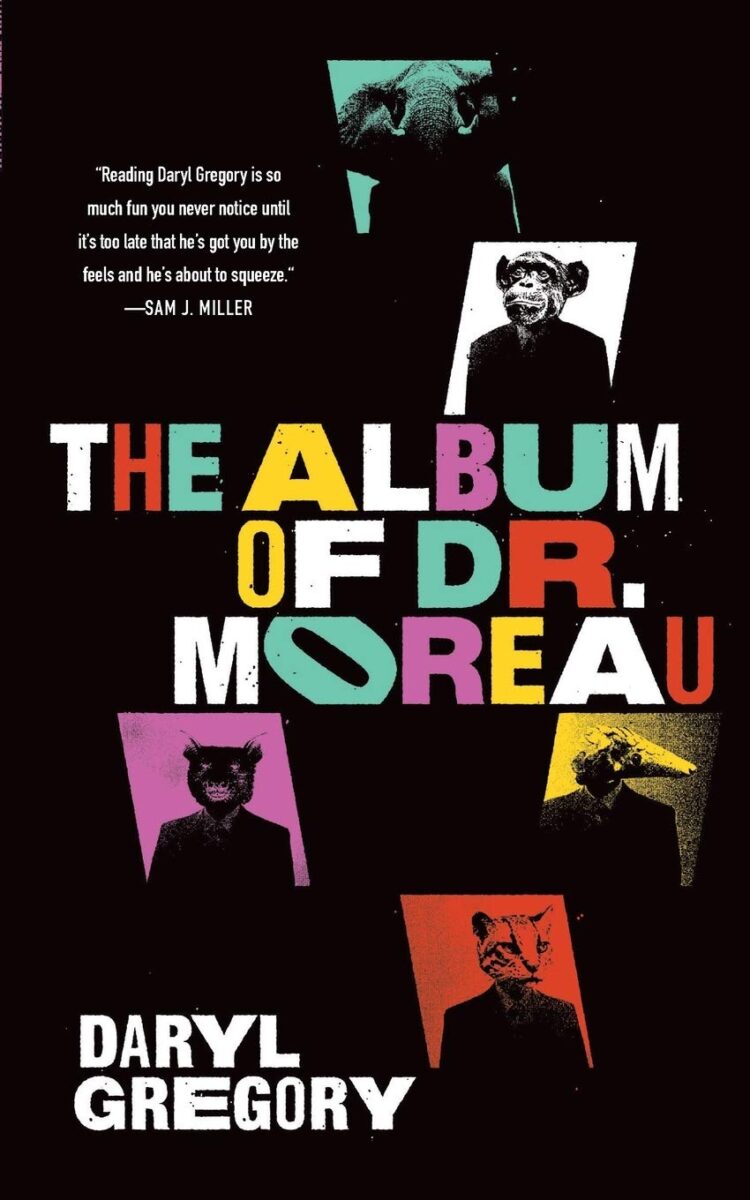The WyldBoyZ aren’t your average boyband. Sure, they have “the smart one,” “the cute one,” “the shy one” and so on, but “the smart one” really does have an elephant’s memory, and “the cute one” really is kittenish. That’s because the boyz are genetic hybrids, each with the features of a specific animal: Matt the Bat, Devin the Bonobo, Bobby the Cat, Tim the Pangolin, and Tusk the…well, elephant, obviously. Their past is shrouded in a haze of trauma, but their present is on full display: they tour the world dancing and singing five-part harmonies, to the ear-splitting delight of predominantly preteen girls. Although there are plenty of adult fans, too, devotees who will do almost anything for the band.
But after a night of hard partying, one of the boyz wakes up to find a mutilated corpse. And so begins Daryl Gregory’s excellent The Album of Dr. Moreau, an homage to mid-1990s boy bands and mid-1890s science fiction. This whodunit also has a healthy dose of Conan Doyle (even though the epigraph quotes T.S. Eliot) as a detective skilled in the arts of deception and her partner look to solve the crime. Was it a crazed fan looking to show twisted support? A fan of a different boyband, looking to destroy the WyldBoyZ? Or was the killer closer still, a member of the entourage—or the band itself?

The night unfolds over the course of several interviews conducted by Detective Lucia “Luce” Delgado and her punny partner Mickey Banks. They learn that the night devolved into sex and drugs, and then further, until blows were exchanged. Threats, too. The band, although at the height of their popularity, might be closer to splitting up than the fans realize. But is the rift due to waning interest, to disagreements about direction, or to several lawsuits alleging financial misconduct? Any of these is a good motive, but Luce isn’t so sure it accounts for all the contradictory clues she’s turning up.
Delgado keeps things close to the chest, very much a modern Sherlock type. She drops cryptic notes to Banks, pursues odd angles of questioning, and overall does the kind of detective work that’s just far enough ahead of the reader that all the reveals feel like bombshells. It’s a great mystery, too—a locked room stumper on top of a slasher murder, with plenty of other red herrings (pun intended).
Yes—speaking of puns, this is a book that delights in sly humor but doesn’t let it undermine the drama. It’s funny enough to have had me giggling to myself throughout, much to the annoyance of those sharing my space. All the characters are extremely funny in their own way, and compelling, too. Each of the boyz is well-drawn and distinct without being a caricature (or at least, if tending toward caricature, then a lovingly satirical one). With ensemble casts like this there’s always the chance that names and faces bleed together into a jumble, but here it’s the characters’ personalities, not their animal qualities, that ultimately make them stand out.
I really, really want to see more of the badass Luce Delgado, and I also want to see Mickey and Matt team up to be a wisecracking, pun-loving detective duo. I really hope that Gregory reuses these characters in some other book because I think they have enormous potential for further adventures.
Nobody ever talks about the Afterward, but I’m going to do it because I appreciated it so much. Gregory acknowledges his previous disdain for boybands and apologizes to his daughter for maligning them. “I think I was afraid that her obsession with bubblegum pop would stop her from appreciating the gritty authenticity of the bands of my youth, such as the Partridge Family and the Monkees.” (That’s sarcasm, for those unfamiliar.) It’s sweet on a personal level, but it also functions as a thoughtful reminder not to gatekeep or roll our eyes (too much). We only disdain pop (and really, anything popular) at our own peril, because it’s shaping the minds and voices of the next generation—in whatever miraculous forms they take.
